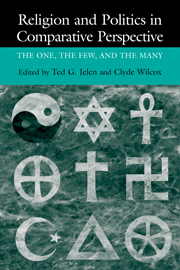Book contents
- Frontmatter
- Contents
- List of Contributors
- Preface
- 1 Religion: The One, the Few, and the Many
- 2 The Challenge of Pluralism
- 3 Catholicism, Politics, and Culture in the Republic of Ireland
- 4 Religion and Politics in Iberia
- 5 The Religious Dimension of Israeli Political Life
- 6 Between Heaven and Earth
- 7 Islamism in Contemporary Arab Politics
- 8 Religion and Politics in a Secular Europe
- 9 Religion and Democracy in South America
- 10 Looking for Hope in Central America
- 11 Religion and Politics in India
- 12 Religion and Politics in Japan
- 13 Religion and Politics in an Open Market
- 14 The Political Roles of Religion
- Index
4 - Religion and Politics in Iberia
Clericalism, Anti-Clericalism, and Democratization in Portugal and Spain
Published online by Cambridge University Press: 05 June 2012
- Frontmatter
- Contents
- List of Contributors
- Preface
- 1 Religion: The One, the Few, and the Many
- 2 The Challenge of Pluralism
- 3 Catholicism, Politics, and Culture in the Republic of Ireland
- 4 Religion and Politics in Iberia
- 5 The Religious Dimension of Israeli Political Life
- 6 Between Heaven and Earth
- 7 Islamism in Contemporary Arab Politics
- 8 Religion and Politics in a Secular Europe
- 9 Religion and Democracy in South America
- 10 Looking for Hope in Central America
- 11 Religion and Politics in India
- 12 Religion and Politics in Japan
- 13 Religion and Politics in an Open Market
- 14 The Political Roles of Religion
- Index
Summary
INTRODUCTION TO RELIGION AND POLITICS IN IBERIA
In the overwhelmingly Roman Catholic “consensual” Iberian region, religion and politics has generally hinged on the issue of clericalism versus anticlericalism. The Roman Catholic Church plays a leading role in the political and social fabric of Portuguese and Spanish society, so it has quite naturally engendered both unbridled loyalty and fierce opposition among the population in each nation. The clerical/anticlerical cleavage has long been a major aspect of Iberian politics and society, but in recent years, its salience has declined under democratic rule in Portugal and in Spain.
This chapter will approach the question of religion and politics in the Iberian peninsular by examining the emergence, development and evolution of the clerical/anticlerical cleavage in both Portugal and Spain. It will first present a brief overview of the religious composition in each nation, then discuss three key phases of the religion and politics relationship in the twentieth century in each country, and conclude with some thoughts on what may account for the narrowing, or perhaps even the eclipse, of the Iberian clerical/anticlerical divide in recent years.
A BRIEF OVERVIEW OF RELIGION AND POLITICS IN IBERIAN SOCIETY
The Religious Composition of Portugal
The population of Portugal (which includes those living on Portuguese territory on the European continent and in the Atlantic islands of the Azores and Madeira) numbers approximately ten million people. Some 97 percent of this population is at least nominally Roman Catholic, and most baptisms, marriages, and funerals are performed according to Roman Catholic ritual.
- Type
- Chapter
- Information
- Religion and Politics in Comparative PerspectiveThe One, The Few, and The Many, pp. 69 - 96Publisher: Cambridge University PressPrint publication year: 2002
- 5
- Cited by



